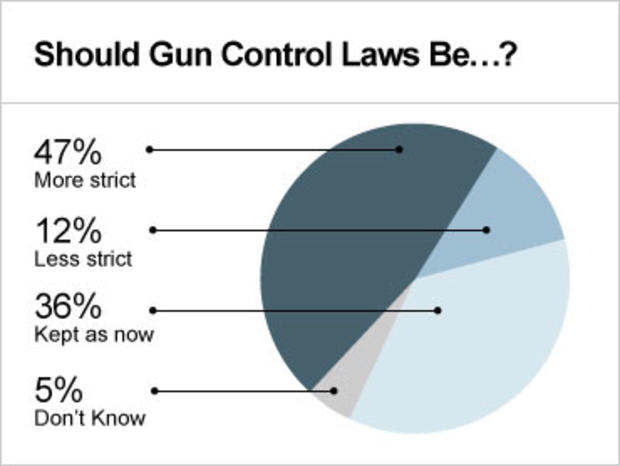Poll: In the Wake of Arizona Shootings, Americans Split on Gun Control
CBS News Poll analysis by the CBS News Polling Unit: Sarah Dutton, Jennifer De Pinto, Fred Backus and Anthony Salvanto.
In the wake of Saturday's shootings in Tucson, Arizona, Americans are split over whether gun control laws should be made stricter, according to a new CBS News Poll.
According to the poll, 47 percent of Americans believe that gun control laws should be more stringent in the wake of the Arizona shootings. Meanwhile, 36 percent believed the laws should remain the same, and 12 percent thought the laws should be made less strict in light of the shootings.
The percentage of those who favor stricter gun control laws is up seven percent from a similar CBS poll in March of 2010 in which 40 percent of respondents said they supported strengthening regulations on gun ownership. In the same poll, 16 percent said gun control laws should be less strict, and 42 percent said they should stay the same.
But support is down from the levels seen in 2002 when 56 percent supported tighter gun control, and in 1994 when stricter gun control had 59 percent support.
Special Section: Tragegy in Tucson
Despite the apparent increase in public support for stronger gun control laws, however, most Americans said that, either way, they didn't think any such laws would have effectively prevented the violence in Tucson this weekend.
Of those surveyed, 36 percent said they thought stricter laws would have done at least a little to prevent the violence. (Of that group, eighteen percent said they thought the regulations would have done "a lot" to prevent the shootings.) But 58 percent of respondents said they didn't think tougher regulations would have had any effect on the situation.
Gun owners, in particular, were less likely to believe that tougher regulations would have prevented the shootings.
Of the 58 percent who said stronger gun control laws would have been ineffective in preventing the Arizona shootings, 77 percent said they had a gun in the household. But of the 18 percent who said they thought tougher gun laws would have done "a little" to prevent the shootings, only ten percent said they had a gun in the house. Seven percent of those who thought stricter laws would have done "a lot" to prevent the shootings said there was a gun in the house.
In the aftermath of the violence in Tucson this past weekend, the debate over gun control has been brought back to the forefront of American political discourse.
Advocates of more stringent regulations argue that the case of Jared Lee Loughner - the 22-year-old man accused of killing 6 people and injuring 14 in the Arizona shootings - exemplifies the overly lax nature gun control laws throughout the country. (Loughner's alleged weapon of choice - a semi-automatic Glock - can be purchased legally in the United States.)
"The law says that drug abusers can't buy guns," said New York Mayor Michael Bloomberg, a strong gun control advocate who co-founded an organization of pro-gun control mayors. "Even though Jared Loughner was rejected by the military for drug use and arrested on drug charges, he was able to pass a background check and buy a gun."
However, others echo Rep. Michael Grimm (R-N.Y.) who urged legislators not to "make rash decisions" in the wake of the shootings.
"The normal instinct, and rightfully so, and it's a good instinct, is to protect. As a legislator, you protect through legislation. I think that's healthy. I think that's normal. I think those intentions are all good. In that regard, I applaud my colleagues," Grimm said in an interview with POLITICO.
"The training tells you, 'Don't make rash decisions, especially right after the event,'" he continued, adding that "those [who] are opposed to guns and want to regulate guns to begin with may use this to bolster their arguments."
Poll: 45% Say Politics Motivated Jared Loughner
Read the Complete Poll
This poll was conducted by telephone on January 9-10, 2011 among 673 adults nationwide who were first interviewed by CBS News December 17-20, 2010. Phone numbers were dialed from samples of both standard land-line and cell phones. The error due to sampling for results based on the entire sample could be plus or minus four percentage points. The error for subgroups is higher. This poll release conforms to the Standards of Disclosure of the National Council on Public Polls.

